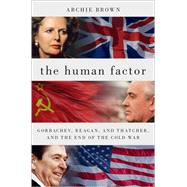The Human Factor Gorbachev, Reagan, and Thatcher, and the End of the Cold War
, by Brown, Archie- ISBN: 9780190614898 | 0190614897
- Cover: Hardcover
- Copyright: 4/1/2020
What brought about an end to the Cold War has long been a subject of speculation and mythology. One prominent argument is that the United States simply bankrupted the Soviet Union, outspending the Soviets on the Strategic Defense Initiative (SDI, or "Star Wars") and forcing a reckoning. Archie Brown's latest work rejects any simple answers. The Human Factor focuses on the human element, and in particular on the main figures involved--Mikhail Gorbachev, Ronald Reagan, and Margaret Thatcher. His book looks at them both as individuals and as engaged in a dynamic that between 1985, when Gorbachev came to power and 1989, when Reagan left office, brought about not only an easing of East-West tensions but a great deal more. Brown argues that the Cold War ended at an ideological level with Mikhail Gorbachev's speech at the United Nations in December 1988, when he announced that the people of every country had the right to choose their own government. The Cold War ended on the ground when the peoples of Eastern Europe took Gorbachev at his word in 1989 and Soviet troops were ordered to stay in their barracks.
The standard narrative of the end of the Cold War--that it was won by the threat of Western (especially American) military power and spending--has underpinned support for the use of force in the Middle East (including the invasion of Iraq in 2003), the expansion of NATO, and advocacy of a hard line toward contemporary Russia. On the other side of the divide, the view that the United States set out to break up the Soviet Union and undermine Russia is widely accepted in Russia today and has led to a hardening of both domestic and foreign policy. Vladimir Putin's high popularity ratings owe much to his being perceived as the leader who restored Russian pride and great power status. Brown ultimately confronts standard, monocausal explanations for the end of the Cold War and does so by offering a nuanced and deeply personal account of the three individuals most responsible for bringing it about.
The standard narrative of the end of the Cold War--that it was won by the threat of Western (especially American) military power and spending--has underpinned support for the use of force in the Middle East (including the invasion of Iraq in 2003), the expansion of NATO, and advocacy of a hard line toward contemporary Russia. On the other side of the divide, the view that the United States set out to break up the Soviet Union and undermine Russia is widely accepted in Russia today and has led to a hardening of both domestic and foreign policy. Vladimir Putin's high popularity ratings owe much to his being perceived as the leader who restored Russian pride and great power status. Brown ultimately confronts standard, monocausal explanations for the end of the Cold War and does so by offering a nuanced and deeply personal account of the three individuals most responsible for bringing it about.







